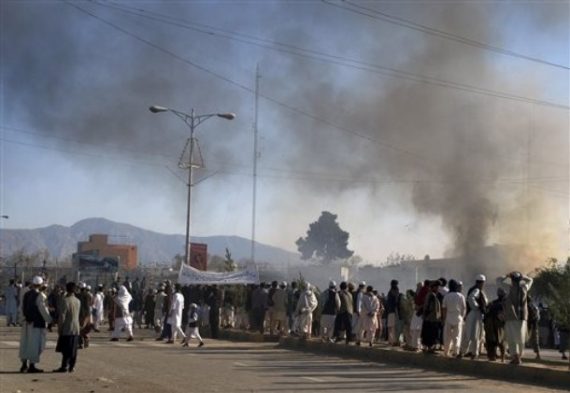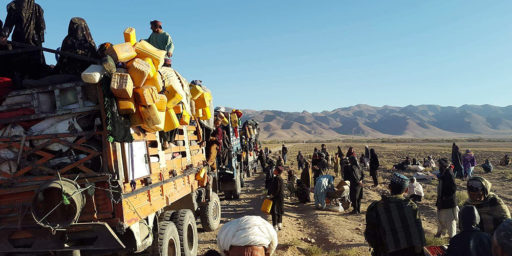Afghanistan’s Tet Offensive?
Todays' horrific attack on the UN complex in Mazar-i Sharif may well the the Tet Offensive of Afghanistan: a relatively minor event that permanently changed the American public's view of the war.
Todays’ horrific attack on the UN complex in Mazar-i Sharif may well the the Tet Offensive of Afghanistan: a strategically minor event that permanently changed the American public’s view of the war.
Details are still sketchy as of this writing but some number of foreign employees (seven, ten, or twenty have been variously reported) of the UN office were killed—two beheaded—another dozen injured after the UN Assistance Mission office was stormed and set ablaze by an angry mob, purportedly in fury over an attention-seeking Florida pastor having burned a copy of the Koran ten days earlier.
To be sure, Afghanistan is in the midst of a long war and foreign non-combatants, including those at the UN, have been attacked and killed before. But Una Moore, an aid worker in Kabul who writes for UN Dispatch, thinks “This attack is different.”
Despite claims by the province governor and some Taliban leaders to the contrary, Moore insists that, “The killers were ordinary residents of a city deemed peaceful enough to be one of the first places transferred to the control of Afghan security forces. The men who broke into the UN compound, set fires and killed 8 people weren’t Taliban, or henchmen of a brutal warlord, or members of a criminal gang. They weren’t even armed when the protests began -they took weapons from the UN guards who were their first victims.”
If that turns out to be the case, it’s a big deal: “Foreigners committed to assisting in the rebuilding of Afghanistan have long accepted the possibility that they might die at the hands of warring parties, but this degree of violence from ordinary citizens is not something most of us factored into our decision to work here.” The effect, Moore believes, will be dramatic:
This is not the beginning of the end for the international community in Afghanistan. This is the end. Terry Jones and others will continue to pull anti-Islam stunts and opportunistic extremists here will use those actions to incite attacks against foreigners. Unless we, the internationals, want our guards to fire on unarmed protestors from now on, the day has come for us to leave Afghanistan.
Granted, the attacks were fresh when she wrote that and it’s just one woman’s reaction. But she’s not alone.
Joshua Foust, a Central Asia expert at the American Security Project, writes at his influential Registan blog that “this is a watershed event.” It’s worrisome enough that a “crowd of Afghans, with no obvious ties to the insurgency, in an area otherwise so successful it was flagged for transition to Afghan control, could so quickly spiral into such madness and fury that they murdered seven foreigners who themselves had precisely zero connection to an outrageous event that happened in a third country.”
Moreover, Foust contends, it’s part of a pattern: “Starting with the Serena Hotel bombing three years ago, there has been a steady increase in violence directed directly at aid workers in Afghanistan. First the insurgency, and now, it seems, regular Afghans, increasingly see those aid workers as part of the problem, and not any kind of solution.”
Today’s events may well be a watershed in another way, too: further undermining the confidence of the American public in an already unpopular war that they’ve been told for months that we’re on the way to winning.
It’s notable that the atrocity took place in the capital of the Balkh province, which is among seven that had been deemed safe and slated for hand-over from the U.S. led coalition to Afghan forces in July. With nearly two-thirds of the American public saying the war was no longer worth fighting, General David Petraeus went to Capitol Hill to urge patience. While acknowledging “setbacks as well as successes” and that “insurgents are already striving to regain lost momentum and lost safe havens as we enter the spring fighting season,” the commander of NATO forces in Afghanistan declared, “The momentum achieved by the Taliban in Afghanistan since 2005 has been arrested in much of the country and reversed in a number of important area,” adding “we believe that we will be able to build on the momentum achieved in 2010.”
Even before today’s attacks, Director of National Intelligence James Clapper and Lt. Gen. Ronald Burgess, director of the Defense Intelligence Agency, provided far gloomier analysis. Burgess told the House Armed Services Committee that “tactical losses, they continue to maintain influence over much of the local population, particularly outside urban areas.” That’s looking eerily prescient now.
To be sure, a few instigators in an angry mob is not the same thing as a massive, nationwide attack by tens of thousands of troops. Nor, I hasten to add, have American military leaders in Afghanistan been anywhere near as rosy and unequivocal as William Westmoreland was in proclaiming imminent victory in Vietnam. For that matter, there’s no figure with the gravitas of Walter Cronkite. Then again, the fight in Vietnam was much more popular two months after the shock of the Tet Offensive than the one in Afghanistan is now.
Tet, despite its size, had little tactical impact. American forces quickly counterattacked and reversed gains from the surprise surge of forces. But the shock got the attention of a public that had gotten accustomed to a drawn out war, placated by assurances that there was light at the end of the tunnel. Mazar-i Sharif could have that impact here. If this can happen in Afghanistan’s “safe” zones after eight years of nation-building, there’s little reason to think we’re anywhere close to the end.





Uh, why do you say it was a false report when the NYT is reporting that a Koran was burned on March 20th?
Post corrected. The previously scheduled burning by the same clown had been called off and I saw discussion on Twitter today that he had not in fact burned a Koran. – jhj
So history is repeating itself as farce?
“a relatively minor event”
Um, the Tet Offensive was the largest military operation of the Vietnam war for either side.
ponce makes the obvious point about this metaphor. Tet was the exact opposite of “a relatively minor event”. That is precisely why it played such a determinative role in the dynamics of the Vietnam War. At a time when there were great claims being made of American successes in the war, and when the Vietnamese were considered to be an ineffective, relatively small-scale guerrilla force, it was the size and scale and organization of Tet that drove home the point that we were not making progress, that we severely underestimated the enemy in many ways, and probably misunderstood what the war was all about, for them al least.
None of these things seem to be operative in the Afghanistan case.Tet was not a watershed moment in that it represented the Vietnamese turning against the US – as seems to be the claim about average Afghans here. Tet was carried out by the people who were fighting the US all along.
I think too much is being made of the fact that such a thing as this can happen. The Afghans have obviously never been thrilled with foreign troop in their country. The fact that some significant sector of the population does support our presence their represents for them, I imagine, quite a leap of faith – a risky expression of trust that all of them probably feel a tad conflicted about. I imagine that might make them extra-sensitive to what can be perceived as expression of a lack of respect, or contempt, from Americans.
Obviously this jerk in Florida speaks only for himself and perhaps some small minority – but that is not necessarily obvious to the average Afghani. On a daily basis we see propagandists in our own country take incidents like this, where one person in some far away country – especially a “cleric” – says or does something outrageous, and fashion an indictment of all the people of that country, all the people of that religion – placing it in the context of a “war of civilizations”. The tactics of the far right seem to be common across borders and cultures.
Or was this all you meant? That this incident is like Tet only in the sense that it might have a certain effect on American public opinion? Or is this just your hope? I don’t see why that might happen. I don’t know that this incident can really be considered to be a source of disillusion – it seemed utterly predictable. Why do you think it will have some special impact?
It might well again raise the question of why we are there? It makes it harder to believe that the UN (or the US) is wanted there by a significant portion of the population … so is the presence just to stop Al Qyeda? Is it forcing nation building on people who don’t want our vision of what their nation is to be? Or is it just inertia, and politicians afraid of the fallout of being the ones who ‘lost’ Afghanistan.
I’m not getting a Tet vibe. This barely registered on my awareness and as you may have noticed, I’m fairly obsessive when it comes to politics.
@ponce and @tano: I’ve changed “relatively minor” to “strategically minor,” which is a much better expression of what I was trying to communicate.
Tet was a big operation but it’s one that had little impact on the ground. It was beaten back quickly. Indeed, by switching to conventional war from a guerrilla-insurgent style, they were back in the American wheelhouse.
What Tet did, though, was remove the scales from the public’s eyes. Having been told that we were making progress and that the thing was almost over, the massive attack showed that they’d been lied to.
@michael reynolds: One thing that’s very different now than 1968 is how we get our information. It’s quite possible that people getting their info from the nightly news–or, hell, not even watching the nightly news–will barely notice.
Indeed, when I first saw the headline earlier in the day, I didn’t bother to click through. But I follow a lot of foreign policy specialists on my Twitter stream and am seeing people used to routine violence taking notice. The Tet analogy came to mind after reading some posts that were going around, notably Una Moore’s.
“What Tet did, though, was remove the scales from the public’s eyes. Having been told that we were making progress and that the thing was almost over, the massive attack showed that they’d been lied to.”
This is true, but I think there’s another aspect of Tet’s impact that it’s important not to overlook. We tend to focus on Cronkite, American public perception etc, but Tet also resulted in a major breakdown of confidence between LBJ and the military brass. The point is that not only had the military been selling success to the public, they’d been selling a similar story to the president too. Tet cemented Johnson’s view that he could no longer rely upon the consel of his military advisers. I don’t know that there’s a parallel to that today. That said, it really does feel like A’stan is limping toward its conclusion.
It’s felt like that for a while now, mind.
This should be a watershed.
It is time to leave these people to their own devices. Nothing will change religious lunacy on this scale.
This confirms that you can’t give people a peaceful, democratic, society. The society must have the framework in place.
But then, those of us seeing the confirmation already knew that, didn’t we?
The questions are whether that’s even what we are trying in Afghanistan for these days, and whether Obama and his generals think they are racking up so many points against the terrorists that the nation-building doesn’t matter anymore.
“What Tet did, though, was remove the scales from the public’s eyes. Having been told that we were making progress and that the thing was almost over, the massive attack showed that they’d been lied to.”
Yes, but U.S. troops remained in Vietnam five more years after Tet.
James:
I’m actually so old that I remember the Cronkite broadcast first-person, live. My dad was home from his first tour and awaiting the orders that would send him back for a second tour. (He ended up involved in an investigation of South Vietnamese corruption in the shipyard. Surprise! He found some.)
But what had even greater impact on me was LBJ’s withdrawal. “I will not seek, and I will not accept . . .” IIRC that came about a month later. Cronkite made an impact but I think I was 14 or 15 so I didn’t get the out-of-character nature and thus full impact of his statement. But LBJ looking about 100 years old, announcing he was done, that’s when I knew it was pointless.
I attended my first and only anti-war demonstration shortly after, in Des Moines Iowa of all places, while my dad was back in Nam. It was a pretty mellow affair, but even then I saw the kids waving North Vietnamese flags and knew it would be my last attendance.